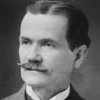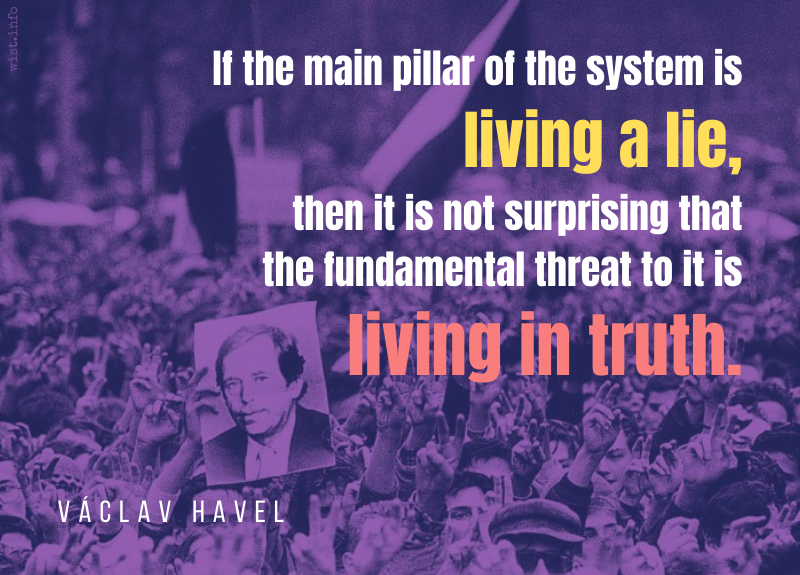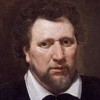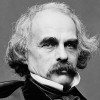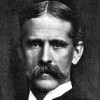Some have learnt many Tricks of sly Evasion,
Instead of Truth they use Equivocation,
And eke it out with mental Reservation,
Which to good Men is an Abomination.Benjamin Franklin (1706-1790) American statesman, scientist, philosopher, aphorist
Poor Richard (1736 ed.)
(Source)
Quotations about:
dishonesty
Note not all quotations have been tagged, so Search may find additional quotes on this topic.
These statements were, as he felt even in making them, not only gratuitous, but utterly unconvincing, but he had arrived at that condition in which a man discovers with terror the unsuspected amount of mendacity latent in his system.
F. Anstey (1856-1934) English novelist and journalist (pseud. of Thomas Anstey Guthrie)
The Brass Bottle, ch. 9 “Persicos Odi, Puer, Apparatus” (1900)
(Source)
Originally published in The Strand Magazine (1900-04).
The great majority of us are required to live a life of constant, systematic duplicity. Your health is bound to be affected if, day after day, you say the opposite of what you feel, if you grovel before what you dislike and rejoice at what brings you nothing but misfortune. Your nervous system isn’t a fiction, it’s a part of your physical body, and your soul exists in space and is inside you, like the teeth in your head. You can’t keep violating it with impunity.
Boris Pasternak (1890-1960) Russian poet, novelist, and literary translator
Doctor Zhivago [До́ктор Жива́го], Part 2, ch. 15 “Conclusion,” sec. 6 [Yury] (1955) [tr. Hayward & Harari (1958), UK ed.]
(Source)
Alternate translations:
The great majority of us are required to live a life of constant, systematic duplicity. Your health is bound to be affected if, day after day, you say the opposite of what you feel, if you grovel before what you dislike and rejoice at what brings you nothing but misfortune. Our nervous system isn’t just a fiction, it’s a part of our physical body, and our soul exists in space and is inside us, like the teeth in our mouth. It can’t be forever violated with impunity.
[tr. Hayward & Harari (1958), US ed.]
A constant, systematic dissembling is required of the vast majority of us. It’s impossible, without its affecting your health, to show yourself day after day contrary to what you feel, to lay yourself out for what you don’t love, to rejoice over what brings you misfortune. Our nervous system is not an empty sound, not a fiction. It’s a physical body made up of fibers. Our soul takes up room in space and sits inside us like the teeth in our mouth. It cannot be endlessly violated with impunity.
[tr. Pevear & Volokhonsky (2010)]
Vanity is a weakness. I know this. It’s a shallow dependence on the exterior self, on how one looks instead of what one is. I know this well. But I have a scar the size and texture of a jellyfish on my abdomen already, and you’d be surprised how your sense of self changes when you can’t take your shirt off at the beach. In my more private moments, I pull up my shirt and look at it, tell myself it doesn’t matter, but every time a woman has felt it under her palm late at night, propped herself up on a pillow and asked me about it, I’ve made my explanation as quick as possible, closed the doors to my past as soon as they’ve opened, and not once, even when Angie’s asked, have I told the truth. Vanity and dishonesty may be vices, but they’re also the first forms of protection I ever knew.
Dennis Lehane (b. 1965) American novelist, screenwriter
A Drink Before the War, ch. 7 [Kenzie] (1996)
(Source)
Those who believe it permissible to tell white lies soon grow color-blind.
Austin O'Malley (1858-1932) American ophthalmologist, professor of literature, aphorist
Keystones of Thought (1914)
(Source)
Of all malice that makes of Heaven a foe
The end is injury, and all such end won
By force or fraud worketh another’s woe.
But since fraud is a vice of man’s alone,
It more offends God: so are lowest set
The fraudulent, and the heavier is their groan.[D’ogne malizia, ch’odio in cielo acquista,
ingiuria è ‘l fine, ed ogne fin cotale
o con forza o con frode altrui contrista.
Ma perché frode è de l’uom proprio male,
più spiace a Dio; e però stan di sotto
li frodolenti, e più dolor li assale.]Dante Alighieri (1265-1321) Italian poet
The Divine Comedy [Divina Commedia], Book 1 “Inferno,” Canto 11, l. 22ff (11.22-27) [Virgil] (1309) [tr. Binyon (1943)]
(Source)
(Source (Italian)). Alternate translations:
Of ev'ry Vice which odious is in Heav'n
To injure is the purport, and the end;
Either by Force, or Fraud. But as to Man
Fraud is peculiar, it more God offends:
Therefore the fraudulent are lower plac'd,
And greater punishment and pains endure.
[tr. Rogers (1782), l. 21ff]
Above the Sons of Violence reside,
The bands of Fraud below together hide;
(Vile Fraud! The heav'n-born soul's peculiar blot!)
For this, in fiercer pains, the traitors keep
Their horrid vigils far in yonder deep;
Hated of Heav'n, and fill the lowest lot.
[tr. Boyd (1802), st. 5]
Of all malicious act abhorr’d in heaven,
The end is injury; and all such end
Either by force or fraud works other’s woe
But fraud, because of man peculiar evil,
To God is more displeasing; and beneath
The fraudulent are therefore doom’d to’ endure
Severer pang.
[tr. Cary (1814)]
Of each malicious act, abhorred on high.
Injustice is the end: for others' woe
Must all such ends or force or fraud apply.
But fraud in man his proper vice doth show,
To God more odious; wherefore deeper here
The fraudful sink, and mourn a sharper throe.
[tr. Dayman (1843)]
Of all malice, which gains hatred in Heaven, the end is injury; and every such end, either by force or by fraud, aggrieveth others.
But because fraud is a vice peculiar to man, it more displeases God; and therefore the fraudulent are placed beneath, and more pain assails them.
[tr. Carlyle (1849)]
Of evil deed, that's stamped with hate in heaven,
Is injury the end. Each end's attained
With force or fraud, by which another's pained.
Since fraud is then the native ill of man,
It more displeases God; beneath the vault,
The fraudulent the deeper pains assault.
[tr. Bannerman (1850)]
Of ev'ry malice which just heav'n abhors,
To injure is the end; and each such end,
Either by force or fraud, makes others grieve.
But since of man fraud is the proper sin,
More it displeases God; and so beneath
Are plac'd the fraudulent with heavier pains.
[tr. Johnston (1867)]
Of every malice that wins hate in Heaven,
Injury is the end; and all such end
Either by force or fraud afflicteth others.
But because fraud is man's peculiar vice,
More it displeases God; and so stand lowest
The fraudulent, and greater dole assails them.
[tr. Longfellow (1867)]
Of every badness which earns hatred in heaven, injury is the end; and every such end either by force or by fraud causes grief to another.
But because fraud is an ill peculiar to man, it more displeases God; and for this cause the fraudulent have their station below, and woe assails them more.
[tr. Butler (1885)]
Of every malice that in Heaven wins hate
The end is injury, and each such plan
By force or fraud on some wreaks woeful fate.
Since fraud is ill peculiar unto man
God it displeases more, and hence more low
The fraudulent are doomed to greater pain.
[tr. Minchin (1885)]
Of every malice that wins hate in heaven injury is the end, and every such end afflicts others either by force or by fraud. But because fraud is the peculiar sin of man, it most displeaseth God; and therefore the fraudulent are the lower, and more woe assails them.
[tr. Norton (1892)]
Of every evil act that earneth hate in Heaven, the end is injury; and every such end, by either violence or fraud, heapeth sorrow upon others. But forasmuch as fraud is man's peculiar vice, it is the more displeasing unto God ; and therefore they who dealt in fraud are set beneath, and greater is the torture that doth afflict them.
[tr. Sullivan (1893)]
All wickedness that lays up hate in heaven
Injustice hath for end, and such end alway,
Either by force or fraud, afflicts another:
But, seeing that fraud is man's peculiar evil,
More it displeases God: therefore are lowest
The fraudulent, and greater woe assails them.
[tr. Griffith (1908)]
Every kind of wickedness that gains the hatred of Heaven has injustice for its end, and every such end afflicts someone either by force or fraud; but because fraud is sin peculiar to man it is more offensive to God, and for that reason the fraudulent have their place lower nad more pain assails them.
[tr. Sinclair (1939)]
Of all malicious wrong that earns Heaven's hate
The end is injury; all such ends are won
Either by force or fraud. Both perpetuate
Evil to others; but since man alone
Is capable of fraud, God hates that worst;
The fraudulent lie lowest, then and groan
Deepest.
[tr. Sayers (1949)]
Malice is the sin most hated by God
And the aim of malice is to injure others
whether by fraud or violence. But since fraud
is the vice fo which man alone is capable,
God loathes it most. Therefore, the fraudulent
are place below, and their torment is more painful.
[tr. Ciardi (1954)]
Of every malice that gains hatred in Heaven the end is injustice; and every such end, either by force or by fraud, afflicts another. But because fraud is an evil peculiar to man, it more displeases God, and therefore the fraudulent are the lower, and more pain assails them.
[tr. Singleton (1970)]
All malice has injustice as its end,
an end achieved by violence or by fraud;
while both are sins that earn the hate of Heaven,
since fraud belongs exclusively to man,
God hates it more and, therefore, far below,
the fraudulent are placed and suffer most.
[tr. Musa (1971)]
Of every malice that earns hate in Heaven,
injustice is the end; and each such end
by force or fraud brings harm to other men.
However, fraud is man's peculiar vice;
God finds it more displeasing -- and therefore,
the fraudulent are lower, suffering more.
[tr. Mandelbaum (1980)]
The object of all malice, which earns heaven's hatred,
Is injury; every object of that kind
Causes distress to others by force or fraud.
And because fraud is an evil peculiar to men,
It displeases God the more; and therefore the fraudulent
are placed beneath and greater pain assail them.
[tr. Sisson (1981)]
The end of every wickedness that feels
Heaven's s hatred is injustice -- and each end
Of this kind, whether by force or fraud, afflicts
Some other person. But since fraud is found
In humankind as its peculiar vice,
It angers God more: so the fraudulent
Are lower, and suffer more unhappiness.
[tr. Pinsky (1994), l. 21ff]
Of every malice gaining the hatred of Heaven, injustice is the goal, and efvery such goal injures someone either with force or with fraud.
But because fraud is an evil proper to man, it is more displeasing to God; and therefore the fraudulent have a lower place and greater pain assails them.
[tr. Durling (1996)]
The outcome of all maliciousness, that Heaven hates, is harm: and every such outcome, hurts others, either by force or deceit. But because deceit is a vice peculiar to human beings, it displeases God more, and therefore the fraudulent are placed below, and more pain grieves them.
[tr. Kline (2002)]
Malice is aimed in all its forms -- and thus
incurs the hatred of Heaven -- at gross injustice,
and, aiming so, harms others, by deceit or force.
Deceit, though, is specifically a human wrong,
and hence displeases God the more. Liars
are therefore deeper down, and tortured worse.
[tr. Kirkpatrick (2006)]
Every evil deed despised in Heaven
has as its end injustice. Each such end
harms someone else through either force or fraud.
But since the vice of fraud is man's alone,
it more displeases God, and thus the fraudulent
are lower down, assailed by greater pain.
[tr. Hollander/Hollander (2007)]
Hated by Heaven, every conscious
sin will end in injustice, and each new sin,
By force or fraud, creates the same result.
But since such fraud is a sin unique to men,
God hates it more. So sinners guilty of fraud
Go farther down, and deeper pain attacks them.
[tr. Raffel (2010)]
Crimes Heaven hates have for their end
Injustice, and that end afflicts someone
Either by force or fraud, and must offend
The Lord, for fraud is human, and ills done
By humans please Him least, and therefore they,
The tricksters, lie down and suffer more.
[tr. James (2013)]
When words stop meaning anything, when truth doesn’t matter, when people can just lie with abandon, democracy can’t work.
Barack Obama (b. 1961) American politician, US President (2009-2017)
Speech, Miami (2 Nov 2018)
(Source)
The rules are simple: they lie to us, we know they’re lying, they know we know they’re lying but they keep lying anyway, and we keep pretending to believe them.
Elena Gorokhova (b. 1955) Russo-American novelist, linguist, educator
A Mountain of Crumbs: A Memoir, ch. 13 (2010)
(Source)
On the relationship between the Soviet government and media and the Soviet people. Sometimes attributed to Aleksandr Solzhenitsyn.
If the main pillar of the system is living a lie, then it is not surprising that the fundamental threat to it is living in truth. This is why it must be suppressed more severely than anything else.
Václav Havel (1936-2011) Czech playwright, essayist, dissident, politician
The Power of the Powerless, title essay (1979)
(Source)
Who dares think one thing, and another tell,
My heart detests him as the gates of hell.[Ἐχθρὸς γάρ μοι κεῖνος ὁμῶς Ἀΐδαο πύλῃσιν
ὅς χ’ ἕτερον μὲν κεύθῃ ἐνὶ φρεσίν, ἄλλο δὲ εἴπῃ.]Homer (fl. 7th-8th C. BC) Greek author
The Iliad [Ἰλιάς], Book 9, l. 312ff (9.312-313) [Achilles to Odysseus] (c. 750 BC) [tr. Pope (1715-20)]
(Source)
Original Greek. Alt. trans.:
For, like hell mouth I loath, Who holds not in his words and thoughts one indistinguish’d troth. [tr. Chapman (1611), ll. 300-01]
For I abhor the man, not more the gates Of hell itself, whose words belie his heart. [tr. Cowper (1791), ll. 385-86]
Hateful to me as the gates of Hades is he who conceals one thing in his mind and utters another. [tr. Buckley (1860)]
Him as the gates of hell my soul abhors,
Whose outward words his inmost thoughts conceal.
[tr. Derby (1864), ll. 373-74]
For hateful to me even as the gates of hell is he that hideth one thing in his heart and uttereth another. [tr. Leaf/Lang/Myers (1891)]
Him do I hate even as the gates of hell who says one thing while he hides another in his heart.
[tr. Butler (1898)]
I hate
as I hate Hell's own gate that man who hides
one thought within him while he speaks another.
[tr. Fitzgerald (1974), l. 381ff]I hate that man like the very Gates of Death
who says one thing but hides another in his heart.
[tr. Fagles (1990), ll. 378-79]
Lying is an indispensable part of making life tolerable.
Bergen Evans (1904-1978) American educator, writer, lexicographer
Quoted in “The Euphemism: Telling It Like It Isn’t,” Time (19 Sep 1969)
(Source)
Sometimes misquoted with the words "Euphemisms persist because," but these are non-quoted text leading up to the quotation.
As soon as people have power they go crooked and sometimes dotty as well, because the possession of power lifts them into a region where normal honesty never pays.
E. M. Forster (1879-1970) English novelist, essayist, critic, librettist [Edward Morgan Forster]
“What I Believe,” The Nation (16 Jul 1938)
(Source)
See Lord Acton.
Treachery and violence are spears pointed at both ends — they wound those who resort to them worse than their enemies.
Emily Brontë (1818-1848) British novelist, poet [pseud. Ellis Bell]
Wuthering Heights, ch. 17 [Isabella Linton] (1847)
(Source)
Good breeding consists in concealing how much we think of ourselves and how little we think of the other person.
Mark Twain (1835-1910) American writer [pseud. of Samuel Clemens]
Note (1898-07-04), Mark Twain’s Notebook, ch. 21 “In Vienna” (1935) [ed. Albert Bigelow Paine]
(Source)
While summering in Kaltenleutgeben, Austria.
Wisdom without honesty is mere craft and cozenage.
Ben Jonson (1572-1637) English playwright and poet
Timber, or Discoveries Made upon Men and Matter (1641)
(Source)
If ever you find yourself environed with difficulties and perplexing circumstances out of which you are at a loss how to extricate yourself, do what is right, and be assured that that will extricate you the best out of the worst situations. Though you cannot see when you take one step what will be the next, yet follow truth, justice and plain dealing, and never fear their leading you out of the labyrinth in the easiest manner possible. The knot which you thought a Gordian one will untie itself before you. Nothing is so mistaken as the supposition that a person is to extricate himself from a difficulty by intrigue, by chicanery, by dissimulation, by trimming, by an untruth, by an injustice. This increases the difficulties tenfold; and those who pursue these methods get themselves so involved at length that they can turn no way but their infamy becomes more exposed.
Thomas Jefferson (1743-1826) American political philosopher, polymath, statesman, US President (1801-09)
Letter to Peter Carr (19 Aug 1785)
(Source)
Better be cheated in the price than in the quality of goods.
[Más vale ser engañado en el precio que en la mercadería.]
Baltasar Gracián y Morales (1601-1658) Spanish Jesuit priest, writer, philosopher
The Art of Worldly Wisdom [Oráculo Manual y Arte de Prudencia], § 157 (1647) [tr. Jacobs (1892)]
(Source)
(Source (Spanish)). Alternate translations:
It is better to be deceived in the Price, than in the Commodity.
[Flesher ed. (1685)]
Far better to be cheated in the price, than in the goods.
[tr. Fischer (1937)]
Better to be cheated by the price than by the merchandise.
[tr. Maurer (1992)]
The treacherous are ever distrustful.
J.R.R. Tolkien (1892-1973) English writer, fabulist, philologist, academic [John Ronald Reuel Tolkien]
The Lord of the Rings, Vol. 2: The Two Towers, Book 3, ch. 10 “The Voice of Saruman” [Gandalf] (1954)
(Source)
For the trouble with lying and deceiving is that their efficiency depends entirely upon a clear notion of the truth that the liar and deceiver wishes to hide. In this sense, truth, even if it does not prevail in public, possesses an ineradicable primacy over all falsehoods.
Hannah Arendt (1906-1975) German-American philosopher, political theorist
“Lying in Politics,” Crises of the Republic (1969)
(Source)
There are very few honest friends — the demand is not particularly great.
[Es gibt wenig aufrichtige Freunde. Die Nachfrage ist auch gering.]
Marie von Ebner-Eschenbach (1830-1916) Austrian writer
Aphorisms [Aphorismen], No. 528 (1880) [tr. Scrase & Mieder (1994)]
(Source)
Autobiography is only to be trusted when it reveals something disgraceful. A man who gives a good account of himself is probably lying, since any life when viewed from the inside is simply a series of defeats.
George Orwell (1903-1950) English writer [pseud. of Eric Arthur Blair]
“Benefit of Clergy: Some Notes on Salvador Dali,” opening words (1944)
(Source)
It is of great importance to set a resolution, not to be shaken, never to tell an untruth. There is no vice so mean, so pitiful, so contemptible and he who permits himself to tell a lie once, finds it much easier to do it a second and third time, till at length it becomes habitual, he tells lies without attending to it, and truths without the world’s believing him. This falsehood of the tongue leads to that of the heart, and in time depraves all it’s good dispositions.
Thomas Jefferson (1743-1826) American political philosopher, polymath, statesman, US President (1801-09)
Letter to Peter Carr (19 Aug 1785)
(Source)
Never regard something as doing you good if it makes you betray a trust, or lose your sense of shame, or makes you show hatred, suspicion, ill will, or hypocrisy, or a desire for things best done behind closed doors.
[Μὴ τιμήσῃς ποτὲ ὡς συμφέρον σεαυτοῦ, ὃ ἀναγκάσει σέ ποτε τὴν πίστιν παραβῆναι, τὴν αἰδῶ ἐγκαταλιπεῖν, μισῆσαί τινα, ὑποπτεῦσαι, καταράσασθαι, ὑποκρίνασθαι, ἐπιθυμῆσαί τινος τοίχων καὶ παραπετασμάτων δεομένου.]
Marcus Aurelius (AD 121-180) Roman emperor (161-180), Stoic philosopher
Meditations, Book 3, #7 [tr. Hays (2003)]
(Source)
Original Greek. Alternate translations:
Never esteem of anything as profitable, which shall ever constrain thee either to break thy faith, or to lose thy modesty; to hate any man, to suspect, to curse, to dissemble, to lust after anything, that requireth the secret of walls or veils.
[tr. Casaubon (1634), #8]
Don't be fond of any thing, or think that for your interest, which makes you break your word, quit your modesty, be of a dissembling, suspicious, or outrageous humor; which puts you up on hating any person, and inclines you to any practice, which won't bear the light, and look the world in the face.
[tr. Collier (1701)]
Never value anything as profitable to thyself which shall compel thee to break thy promise, to lose thy self-respect, to hate any man, to suspect, to curse, to act the hypocrite, to desire anything which needs walls and curtains.
[tr. Long (1862)]
Think nothing for your interest which makes you break your word, quit your modesty, hate, suspect, or curse any person, or inclines you to any practice which will not bear the light and look the world in the face.
[tr. Zimmern (1887)]
Never esteem anything as of advantage to thee that shall make thee break thy word or lose thy self-respect.
[tr. Morgan, in Bartlett's (1894)]
Never value as an advantage to yourself what will force you one day to break your word, to abandon self-respect, to hate, suspect, execrate another, to act a part, to covet anything that calls for walls or coverings to conceal it.
[tr. Farquharson (1944)]
Never value the advantages derived from anything involving breach of faith, loss of self-respect, hatred, suspicion, or execration of others, insincerity, or the desire for something which hast to be veiled and curtained.
[tr. Staniforth (1964)]
Never value as beneficial to yourself something that will force you one day to break your word, abandon your sense of shame, hate, suspect, or curse someone else, pretend, or desire something that needs the secrecy of walls or curtains.
[tr. Gill (2013)]
Value nothing which compels you to break your promise, to abandon your honor, to hate, suspect or curse anyone, to be a hypocrite, or to lust after anything which needs walls or decorations.
[tr. @sentantiq (2019)]
Some causes will force you to betray faith, abandon shame, hate or suspect another person, call down curses, put forward explanations, or desire something that requires walls and fences. Do not regard these causes as necessary or beneficial to yourself.
[Source]
To be glad of life because it gives you to chance to love and to work and to play and to look up at the stars — to be satisfied with your possessions but not content with yourself until you have made the best of them — to despise nothing in the world except falsehood and meanness, and to fear nothing except cowardice — to be governed by you admirations rather than by your disgusts — to covet nothing that is your neighbors except his kindness of heart and gentleness of manners — to think seldom of your enemies, often of your friends, and every day of Christ; to spend as much time as you can in God’s out-of doors — these are the little guideposts on the foot-path to peace.
Henry Van Dyke (1852-1933) American clergyman and writer
“The Foot-path to Peace,” Tacoma Times (1 Jan 1904)
(Source)
Often shortened to: "Be glad for life because it gives you the chance to love and to work and to look up at the stars."





